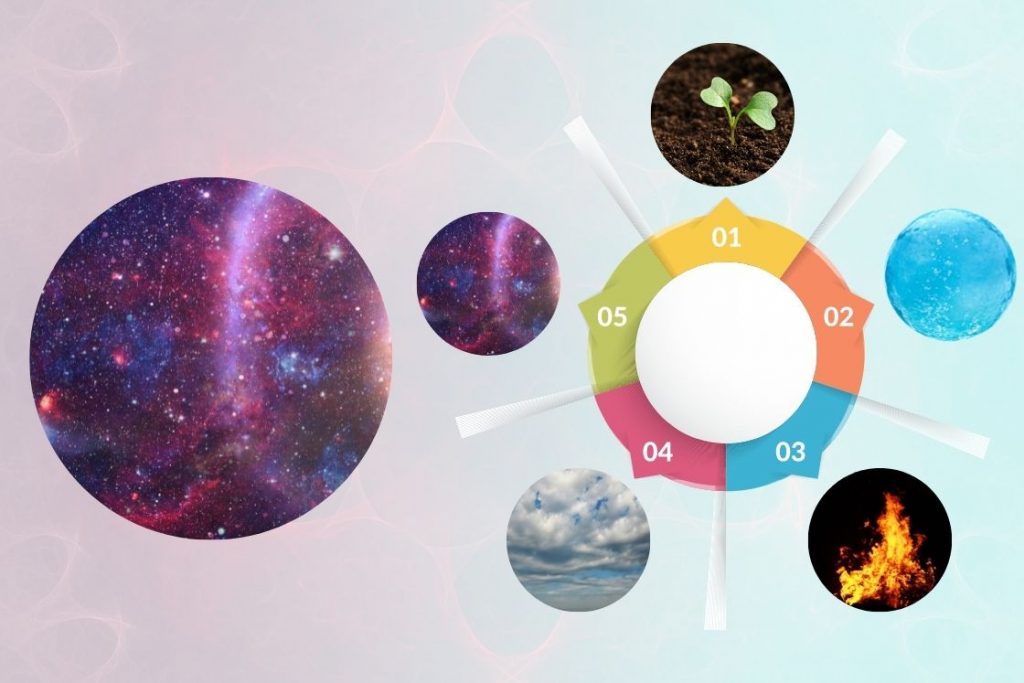
The ether element, also known as space and Aakash in Sanskrit is the first and the most subtle element of the Pancha tatva. This element is the essence of emptiness and the space provided by it is filled by other 4 elements; earth, water, fire and air.
The ear is the related sense organ associated with the ether element whereas the mouth is the organ of action.
The qualities of ether are not inherent but it takes up the qualities due to the absence of the properties of the other 4 elements.
Ether is cold because it lacks the warmth of the fire, it is light in weight as it lacks the heaviness of earth and water, and it is immobile as it lacks the mobility and fluid nature of air.
It has been called a subtle element as you cannot feel its profound presence yet it is present everywhere. This element has no boundaries and thus forms a part of all the other elements.
Ether gives space for the other elements to exist, and in our body, all the movement is done within this empty space. The hollowness of the head, mouth, nose, ears, intestines, lungs, food pipe, heart, stomach, bladder, uterus, are all representative of the ether element.
This emptiness or hollowness gives space for the organs to take their place and the other 4 elements to make them function optimally.
The symbolism of the ether element
In various cultures, the element of ether has been seen as a spiritual element. It is considered a bridge between the cosmos and the terrestrial world. Due to its emptiness, subtleness and omnipresence, it is considered as all-pervading.
The ether element is also called spirit as it is not present in a physical form. Even though this element doesn’t have a symbol, it is often represented as a circle, spiral, or eight-spoked wheel.
Quintessence is also a term that is quite often used for ether as it denotes the “heavenly bodies” present in the universe such as the stars and galaxies.
Let us have a look at how ether is symbolic in various aspects.
Ayurveda
The Ayurveda considers ether as the space through which all the movement and functions of the organs take place.
The space in the uterus is where the fetus is developed.
The hollowness of the lungs allows you to breathe in oxygen and how the hollowness of the heart allows it to pump and fill itself with blood.
The space in the food pipe helps in swallowing the food and reaching the stomach. The intestines or the guts absorb the nutrients.
The space in the head is acquired by the brain and the bones of the skull also protect it.
The space in the ear, nose, and mouth helps you to hear, smell/breathe and talk.
Even the pores in the skin, from where the sweat is released are also a form of space from where the toxins are let out.
When talking about dosha, air and ether make up the vata dosha, therefore even the imbalance of ether leads to an imbalance of vata.
Also, any imbalances in the other 4 elements also cause the restriction or expansion of the ether or space within the body.
Spiritual, Historical and Cultural
In Greek mythology, ether is what God breathes. The ether is also referred to as a deity, Aether, who is the son of Erebus (deity of darkness) and Nyx (Goddess of Night).
Aristotle was the first one to introduce a fifth element which was present in the celestial regions, moved circularly, and did not possess qualities like the classical elements (air, water, fire, and earth). It was quite later that the commentators of this philosophy started calling this element aether.
The concept of ether has also been used to explain the concept of gravitation, light, and how the pressure of ether is responsible for the density of the planets.
In the Hindu culture, the word Akash is said to be derived from the Sanskrit root word kas which means “to be”. In Vedic Sanskrit, akash has a masculine noun whereas in Classical Sanskrit it takes a neutral gender.
It is believed that space was the first element that was created and the rest followed later. The word akasha is also seen as one of the 1008 names of Lord Shiva.
The Jains refer to this element as space. It is one of the six substances or dravyas that encompasses soul, matter, the principle of motion, the principle of rest, and the principle of time.
Chakra
As the characteristic of ether is sound, it becomes obvious that Vishuddha or the Throat Chakra is related to this element. It is this area where the voice box is located and your ability to speak and be heard is all dependent on the throat.
It is one of the chakras where the energy becomes blocked or imbalanced quite easily.
Functions of the ether element

The basic function of ether is to provide a space to exist. In your body, the organs, bones, tissues, cells occupy a specific space. Their optimal functioning as well is dependent on the space provided by compression, expansion, and movement between or within those organs.
Imbalances in the ether element
Ether is also an element that is easily affected by the imbalances caused by other elements. For example, when you have a cold due to excess water, excess mucus can block your nasal cavity. Similarly, in case of acidity due to excess fire element, bloating can cause your abdomen to swell. This can take up the space of other organs.
Moreover, by paying attention to the sounds emitted from your body, you can also identify whether you have any ether imbalances. Wheezing, gurgling sounds from the stomach, cracking of joints, abnormal sounds from the heart, etc are a few signs which will let you know that you need to work on the ether element.
Thus, imbalances can be due to other elements and disturbances within the ether element itself.
Some of the signs for imbalances are listed below.
Excess ether element
- Spaciness, sense of detachment
- Destruction of tissues which causes diseases such as Parkinson’s Disease
- Ungrounded, dizziness, restlessness
- Heart palpitations
- Muscle spasm
- Insomnia
Deficient Ether Element
- Stubborn, inflexible
- Tightness in channels
- Asthma
- Muscle soreness due to restriction
Other signs of imbalances can be seen as thyroid disorders, throat problems, speech disorders, epilepsy, madness, ear diseases, weight gain, heart-related problems, etc.
Practices to Balance ether element in body
The season of winter is considered to be the season of ether hence all the practices should be aimed at avoiding any severe lightness. Yoga, meditation, pranayama, diet, and nature walks are some easy yet extremely powerful ways through which you can keep your ether element in balance.
We have listed some ways through which you can connect to your element easily.
For excess ether
In case of excess ether element, you can follow the following practices;
Moist and heavy foods will help in filling up the physical emptiness in your stomach. Eating warm-cooked meals will be helpful in decreasing the element.
For emotional emptiness, surround yourself with loving people, taking up activities related to sound or voice such as singing, reading, etc.
Make sure to go to bed by 10 pm and get a restful sleep.
Performing the Shoonya Mudra, placing the tip of your middle finger at the base of the thumb and gently pressing the back of the finger with the thumb, will decrease the space element.
For deficient ether
In case of deficiency of ether element, you can follow the following practices to increase it;
Incorporate bitter foods into your diet. It is known to have both air and ether elements and this taste is known to cleanse the body and create more space.
Try to let more light into your routine. Go out for a walk in the morning, open your windows to let in more sunlight, or watch the sunrise. Light helps in “waking” up your body, activating your digestive system at the right time, enhancing focus, and resetting your body clocks.
Do not control your natural urges such as thirst, sleep, hunger, urine, etc as it may result in constriction of space.
Practising Humming Bee Breath or Brahmari Pranayama will be beneficial in increasing ether element proportion as it helps stimulate the throat and also unblock the sinus.
Also, you can practice the Aakash Mudra by joining the tips of the middle finger and the thumb, to increase the space element.
Almost all yoga poses will be beneficial in balancing the ether element as yoga helps in bringing awareness to the breath and calming the mind. It also helps loosen and strengthen the muscles that will prevent the onset of diseases or ailments.
Restorative yoga poses will help in self-reflection and improve mental clarity. Whereas intense, hot, or Bikram yoga forms will help in producing sweat and in turn aid in detoxification.
Mantra chanting during meditation will help stimulate not only the throat but the enhanced vibrations will help you connect to the cosmos.
Conclusion
Though ether or space may seem like nothing but emptiness, it imbibes within itself everything and anything that you can see and perceive. The entire universe is a space that has millions of stars, galaxies, and other gaseous or solid matter. The earth is a small part of that vast space and humans are an even smaller part of the cosmos.
Within us, all the organs, nerves, veins, cells, and every single molecule that builds the structure of the body acquires space.
Thus, even though ether has a more spiritual connotation, it doesn’t lose its importance in comparison to the other more physically abundant elements.




